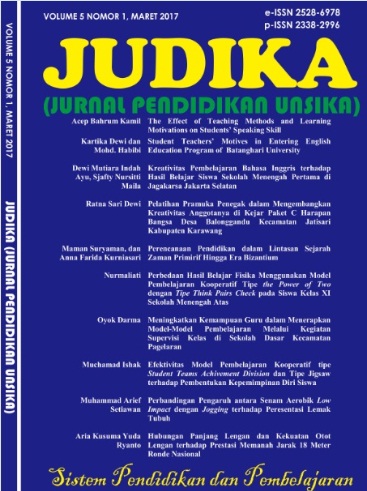STUDENT TEACHERS’ MOTIVES IN ENTERING ENGLISH EDUCATION PROGRAM OF BATANGHARI UNIVERSITY
DOI:
https://doi.org/10.35706/judika.v5i1.680Abstract
The purpose of this research is to describe the Student Teachers’ Motives in Entering English Education Program of Batanghari University. This research was conducted as qualitative research by using questionnaire and interview. The participants of this research are five males and five females of English Education Program who had passed the 4th semester and whose GPA were more than 3,00. In questionnaire there are 14 questions. The result of this research shows that Student Teachers’ Motives in Entering English Education Program are coming from the extrinsic motive in which almost all students think about their goal after finishing the study in the university such as finding job as an English teacher, working in a company, and international hotel to get much money for the better future.
Keywords: student teachers’, motives.
Downloads
References
Aliakbari, M., and, Monfared, M. 2014. “Iranian Students’ Beliefs and Motivations towards English”. Proceedings of Social and Behavioral Sciences, 98, 200-206.
Bley-Vroman, R. 1989. “What is the Logical Problem of Foreign Language Learning”. Journal of Linguistic Perspectives on Second Language Acquisition. 4, 1-68.
Chalak, A., and Kassaian, Z. 2010. “Motivation and attitudes of Iranian undergraduate EFL students towards learning English”. GEMA: Online Journal of Language Studies. 10, (2), 37-56.
Creswell, J. W. 2008. Educational Research: Planning, Conducting, and Evaluating Qualitative and Quantitative Approaches. London: Sage Publication
Dörnyei, Z., and Ushioda, E. 2009. “Motivation, language identity and the L2 self”. Journal of Multilingual Matters. 36, 9-42.
Gardner, R. C. 1985. Social psychology and second language learning: The role of attitudes and motivation. London: Edward Arnold Publishers.
Gardner, R. C., and MacIntyre, P. D. 1991. “An Instrumental Motivation in Language Study”. Journal of Studies in Second Language Acquisition. 13(01), 57-72.
Levesque, C., and Brown, K. W. 2007. “Mindfulness as a Moderator of the Effect of Implicit Motivational Self-Concept on Day-to-Day Behavioral Motivation”. Motivation and Emotion. 31, (4), 284-299.
Lincoln, Y. S., and Guba, E. G. 1990. “Judging the quality of case study reports. Internation Journal of Qualitative Studies in Education”. 3, (1), 53-59.
Mattarima, K., and Hamdan, A. R. 2011. “Learners’ Motivation and Learning Strategies in English Foreign Language in Indonesian Context”. Journal of Edupres. 1, 100-108.
Paese, P.C. 1984. “The Effects of Cooperating Teacher Intervention and a Self-Assessment Technique on the Verbal Interactions of Elementary Student Teachers”. Journal of Teaching in Physical Education. 3, (3), 51-58.
Patton, M.Q. 1990. Qualitative Evolution and Research Method. Newbury Park: Sage Publications.
Ryan, R. M., and Deci, E. L. 2000. “Self-Determination Theory and the Facilitation of Intrinsic Motivation, Social Development, and Bell-Being”. American Psychologist Journal. 55(1), 68.
Sinclair, C. 2008. “Initial and Changing Student Teacher Motivation and Commitment to Teaching”. Asia?Pacific Journal of Teacher Education. 36, (2), 79-104.
Skehan, P. 1991. “Individual Differences in Second Language Learning”. Journal of Studies in Second Language Acquisition. 13, (02), 275-298.
Topkaya, E. Z., and Uztosun, M. S. 2012. “Choosing teaching as a career: Motivations of Pre-service English Teachers in Turkey”. Journal of Language Teaching and Research. 3, (1), 126-134.
Vallerand, R. J. 2000. Deci and Ryan's Self-Determination Theory: A View from the Hierarchical Model of Intrinsic and Extrinsic mMotivation. Journal of Psychological Inquiry.1, (1), 312-318.
Wells, G. 2011. “Motive and Motivation in Learning to Teach”. Sociocultural Theories of Learning and Motivation: Looking Back, Looking Forward, 10, 87-107.
________. 2002. “The Role of Dialogue in Activity Theory”. Journal of Mind, Culture, and Activity. 9, (1), 43-66.
Wrzesniewski, A., Schwartz, B., Cong, X., Kane, M., Omar, A., and Kolditz, T. 2014. “Multiple Types of Motives don't Multiply the Motivation of West Point cadets”. Proceedings of the National Academy of Sciences, 111, (30), 10990-10995.



